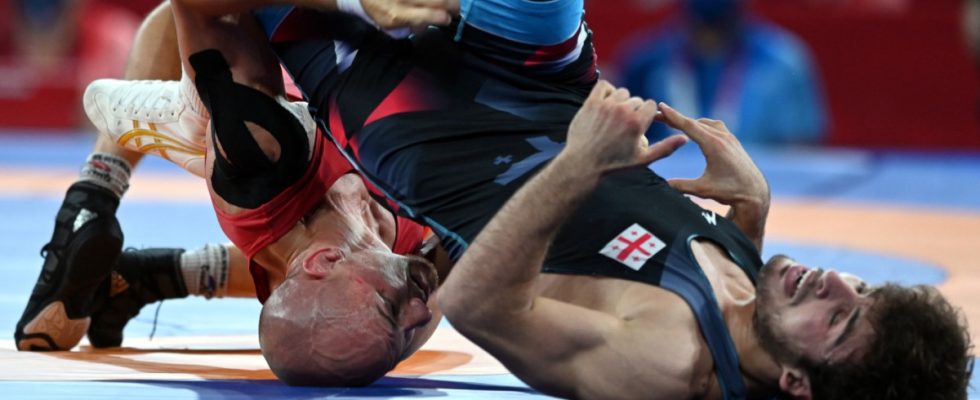“The way he moves. There isn’t a single wrong movement.” The admiring words of two spectators are kept in whispers so as not to miss a word from the master. Because while Frank Stäbler is giving tips, on Sunday he is simultaneously knocking his sparring partners onto the mat in the fight cage so that it just makes a noise. And these are not narrow-chested beginners, but seasoned, fully tattooed guys with thick arms and determined expressions. “Always keep your hips on the man!” shouts Stäbler, before the next second he whirls the next one of these blocks through the air as if it were a feather-light rubber doll.
Mixed martial arts is usually trained here at the Munich MMA fighting school at Nordbad, but when the multiple world wrestling champion is a guest, the BJJ variety comes up: Brazilian Jiu-Jitsu, with a focus on ground fighting. Of course, Stäbler is familiar with this: “You can’t do anything to me like that,” he shouts, clinging to the other person’s with his paws, “so I’m in an extremely superior situation.” A little later there is a rumble again, Stäbler bounces up and asks the gasping group of three fellow fighters: “A few more throws?” And the others like this: Hmm.
A phenomenon, this Stäbler. Indestructible, always on air, still as fit as the famous sneaker even two years after retiring. For everyone who is not so experienced in one of the oldest sports: The 34-year-old became world champion in Greco-Roman style in 2015, 2017 and 2018, European champion in 2012 and 2020, won bronze at the Olympics in 2021 and is the only world champion in three Weight classes could be. And it is: unique. It’s only logical that he gave his first book the title “Unstoppable” and sums up his career in one word. Short reading sample? “You don’t have to be exceptionally talented to become an exceptional player. Not every world champion is outstanding in their youth. I was at the German Championships four times in the C and B youth categories. Well, what can I say: I’m four times Finished fourth. Four times. So nothing, at least for me.”
Frank Stäbler (r.) at the book launch together with journalist and philosopher Simon Biallowons.
(Photo: Leonhard Simon)
There weren’t too many defeats in the next 20 years: the stubborn, headstrong Swabian hurried from triumph to triumph, primarily due to his willpower. In 2016, the crowning moment was at the Olympic Games in Rio: Stäbler had become world champion the year before, had dominated the entire season, was number one in the world rankings, and the absolute favorite for gold. But in the last second of training, his training partner slips on a drop of sweat and falls on Stäbler’s ankle, so that all the ligaments tear – a week before the Olympics. The doctor says: ‘It’s not that bad. We’ll put a plaster around it and in three months they’ll be able to do sports again.’ Stäbler laughs and shouts: ‘Nothing, I’ll be Olympic champion next week.’ And the unstoppable man actually goes into the hopeless battle with a bandage and painkillers and comes seventh. His message: Don’t steal my dream.
“Fun-stoppers don’t become champions”
The book, which was created with Simon Biallowons, managing director and chief editor of Herder Verlag, has of course become a guide. The subtitle is: “Your formula for success, satisfaction and balance”. The topics: How do I prepare for a fight? How do I structure its process? How do I deal with failure and success, with stress, fears and pressure to perform? And: What comes after the fight? Listening to him answer all of these questions that can easily be transferred into real life is fun because he speaks the way he speaks like a Swabian beak: straightforward, undisguised, approachable. A few core principles of Stäbler’s theory of motivation: “If the why is strong enough, the how comes all by itself.” Or: “Fun-stoppers don’t become champions.” Also nice: “You can’t run away from fear.”
Stäbler underlines all of this with stories from his busy life, says that he hasn’t watched TV or the news since 2015, and sees the so-called boil before the fight, when the already well-trained person has to sweat off another nine kilos, “the best way, discipline “to learn” and is happy about the privilege of being able to simply go to the fridge after his career and eat and drink whatever he wants: “I’m always laughed at because I eat so slowly and with pleasure.” And the sport? Doesn’t he miss it at all? “Oh, once or twice a week I go over to my training camp, where 70 or 80 men train. Then I grab one of the boys, give him a quick lesson – and then I can’t move for three days.”

